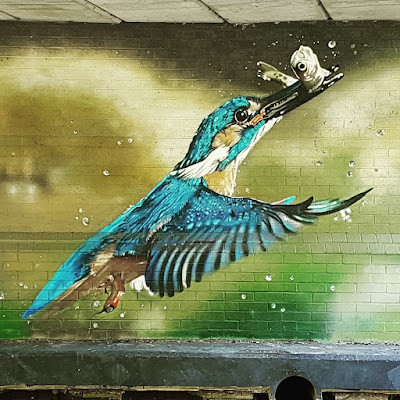Saturday, 19 May 2018
oxford canal mural project, sunny days-chilly evenings, where are the bees?
One of the highlights of my Oxford canal walk is the Oxford Canal Mural Project. Perhaps the most striking work is Richard Wilson's kingfisher under the bridge near the Trap Grounds. Though all the murals are a joy to see.
Loving the sunny weather. Great to sit at the top of the garden at sunset - despite the chilly evenings.
What isn't so great is the almost total absence of bees this summer. With shrubs like the weigela in bloom and aquilegia flowering, I would have expected the garden to be buzzing but there's hardly anything.
As the Berks, Bucks & Oxon Wildlife Trust says, 'Heavy use of toxic sprays on flowers, intensive agriculture and a reduction in the number of insect pollinated crops has brought about a huge drop in bee populations. Urbanisation and loss of habitat have hit bees hard. Indeed some wild bee species are close to extinction. Never more so than now, bees need your support.' But, can this sudden absence be explained by sprays or was the hard winter to blame? Will numbers increase? If so when? The garden soundscape without bees is so unnerving.
Subscribe to:
Post Comments (Atom)

No comments:
Post a Comment